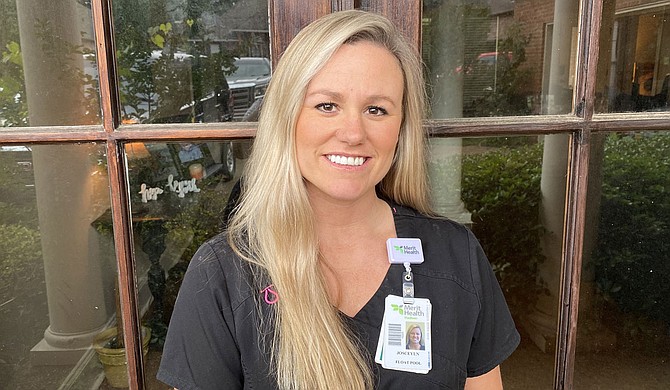Amid a pandemic, Joscelyn Allen, 34, is grateful to work as a nurse. "I feel lucky to have chosen a profession I love," she says, adding that it is rewarding to watch COVID-19 patients get better. "They can't have family with them. They're thankful for you being there."
Originally from Yazoo City, Allen graduated from Benton Academy in 2004 and then from the Holmes Junior College nursing program in 2008, securing a full-time job at the University of Mississippi Medical Center that same year.
She later earned her bachelor's degree in nursing from Mississippi University for Women in 2013. Since entering the field, she has worked at Sta-Home Health, TrustCare Heart Clinic, St. Dominic Hospital and Merit Health Madison, where she currently works.
Allen began her career as a medical surgical nurse and a nurse educator but now operates in a designated float pool, going back and forth between the medical surgical, emergency-room and intensive care units. "I like the new learning exposure that comes with the job and being able to teach and also learn. Nursing is such a vast profession--you can learn things every day," she says.
The nurse currently works three to four days a week, 12 hours each day. Life has changed for most of the world over the past several months, no more acute than hospitals. "We never used to wear protective gear at all times. Now we're wearing masks and gowns and foot coverings," Allen says.
With far fewer surgeries during COVID-19, she says, many personnel are cross-training to help in ICU and emergency rooms.
"The lack of patients is obvious," she says.
"When we do see a COVID-positive patient, we're decked out head to toe. The patient is coughing, and you have to wonder if the mask is going to protect you. We're breathing heavy. It's hot in the mask. Not an easy situation for sure."
Of course, the protections do not end at the hospital door. "When I get home I leave my shoes in the garage. I go straight to the laundry room, which is by the garage. I take off the scrubs and proceed to an antibacterial shower. I don't want to bring it home to my family," Allen says.
And there are sacrifices. "I haven't seen my parents in a month, who are in the at-risk category, she says. Her son is doing distance learning. "I worry about his education in the long-run," she says. Still, Allen knows her purpose: helping her patients. "I like to think I spend a little more time talking with them now than I would have before all this happened," she says.



Comments
Use the comment form below to begin a discussion about this content.
comments powered by Disqus